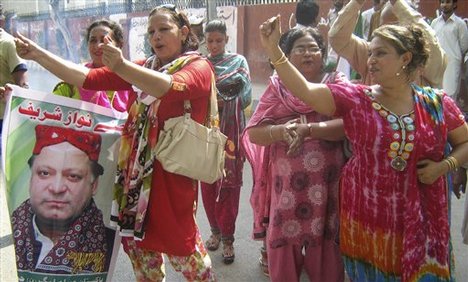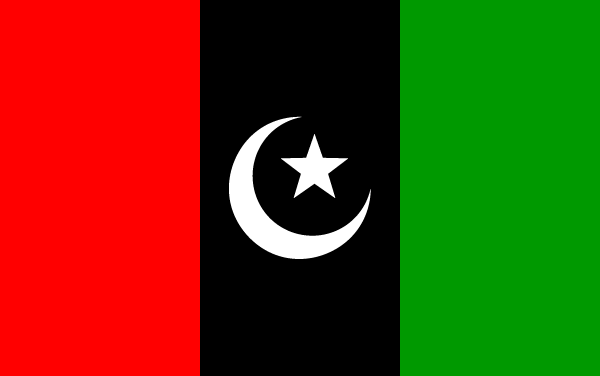Night of The General
YOUNG GENERAL RANI
The woman was a phenomenon. Easily the most influential figure during Pakistan’s second military regime, with the slightest gesture of her bejewelled hand she could guarantee employment, ensure promotions and bring about unwelcome transfers. Yet, interestingly, few even know her real name: Akleem Akhtar. General Rani she was, and remains to all but an intimate few.
There are enough reasons for the lady’s ascension to local legend status. In her glory days she seemed omnipotent and was brazen about her exploits. And now, even while suffering from breast cancer that has led to metastasis in the liver and kidney, bedridden and in semi-seclusion, she remains spirited and outspoken.
Yet, doing a story on her was probably the most difficult assignment I have undertaken. For one thing, everyone I was certain was acquainted with her, was reluctant to even own up to the fact that they knew her. So, for starters, I made a call to her daughter, Aroosa Alam, the defence journalist for the Pakistan Observer and the news coordinator for the Middle East Broadcasting Company, and pop star Fakhre Alam’s mother.
Aroosa nipped all efforts at contact with her mother in the bud, claiming that not only was General Rani far too unwell to entertain visitors, but also, her brothers were completely against their mother appearing in the press. “My mother has been hurt sufficiently by the media already; we don’t want her private life exploited any further,” stated a stern Aroosa.
A call to Naureen and Arshad Sami, Adnan Sami Khan’s parents, proved equally unsuccessful. Although General Rani is Naureen’s maternal aunt, she politely but firmly denied even knowing the lady. There was a similar response from Zil-e-Huma, whose mother Madame Nur Jehan’s friendship with General Rani was legion. Huma completely denied any knowledge of the woman.
A journalist working for the Jang group, Maqsood Butt nearly had an apoplexy when I mentioned the story I was working on. While in the past Maqsood Butt had written extensively on this topic and is said to have close ties with the family, he has for several years, refrained from even bringing up her name in an article.
“I promised her that I would never talk about her or her family again,” he stated nervously and refused to help me in any way.
Clearly, the woman I was seeking out was no ordinary woman. As I kept running into a blind alley and became increasingly despondent, General Rani’s lawyers, S. M. Zafar and Ijaz Batalvi, Mustafa Khar, and a few journalists and government officials who wish to remain anonymous, appeared like beacons and lit my way.
A sneak visit was arranged to General Rani’s house and thereupon begins this story.
The house General Rani resides in is rather small, with little more than a handkerchief-sized lawn in front, and the main door opening into a virtually non-existent hall that leads straight to her room. There was an air of neglect about the house; the garden was unkempt and the floor unswept. General Rani was lying in bed. My first impression was one of shock. Having visualised an elegant, elderly woman, I was instead confronted by a dark, overweight woman. Her hair had obviously suffered due to heavy doses of chemotherapy, and the loss of hair accentuated the pock-marks on her face. But though visibly ill, she was in good spirits and happy to entertain visitors – a commodity I suspect, is a rare treat nowadays.
General Rani hails from a village in Gujarat. Her father was a zamindar and the family was reportedly well-to-do. Those who knew her family describe their house as one of the bigger mansions in the area, with a number of servants running around to the residents’ bidding.
From the outset, Akleem was an independent spirit. She was a tomboy, fond of outdoor sports and hunting. And though she did not even complete her matric, her sharp intelligence more than compensated for her lack of education.
At a tender age she was married to a police officer many times her senior. Though the marriage lasted for some time and she bore six children, General Rani was never happy. Her husband was a traditionalist and believed that a wife’s primary duty was to serve her husband. A woman as strong and independent as she found this hard to digest, and squabbles were common between the two. The sham their marriage was eventually reduced to, collapsed one day – right on Murree’s Mall Road.
One summer, when the family was vacationing in Murree, a burqa-clad Rani and her husband went for a stroll on the Mall. As was customary for him, he walked a step or two behind her so as to keep an eye on her. Suddenly there was a gust of wind – “a lovely breeze” says she, and quite spontaneously Rani lifted the naqab covering her face to allow the breeze to caress her cheeks.
Her husband immediately tapped her with his walking stick to reprimand her. Enraged and insulted, she threw caution to the wind and flung her naqab to the ground, and her abaya into a cracking fire. She then turned to face her husband with a defiant gleam in her eyes.
She explains her reaction in these words: “I just felt I had had enough. The anger and frustration had been building up inside me for many months, but that day, it just all came oozing out. I wanted to tear my husband’s muffler into bits, scratch his face, pull his hair out, and do all sorts of damage to him. The only thing that stopped me were the people on the Mall.”
Though this incident marked the end of her marriage, the official divorce process (if there was one) took place later. Most sources agree that Rani was only married once, but one of her closest friend states that there was a second marriage, much later in her life and of an extremely short duration. Whatever the truth of that marriage, the dramatic end of her first proved a turning point in her life and transformed Rani irrevocably. She began to thrive on her independence and her life philosophy evolved into a specific ambition. As she puts it, “I was determined to beat men at their own game. Since my husband was in the police, I had been observing men in positions of power throughout my married life and I had realised that all men in positions of power needed a vent and the vent they require the most is a bedmate provided through a reliable agency. The higher a man’s position, the greater his demand.”
In one interview, Rani stated: “I knew that dumb, pretty girls who come with no strings attached are a universal failing of men in power. After my marriage collapsed and I had to find the means to support myself and my children, I decided to become the provider of such girls to men in need.”
In yet another conversation, she talked about the understanding she gained of the workings of the government by listening to her husband’s complaints. “I realised that in this country everything worked on mutual favours and the profession that I had chosen for myself entitled me to these favours.”
This outspokenness notwithstanding, Rani maintains she personally never allowed herself to be used or even thought of as any man’s keep. She contends she maintained her dignity and saw herself as a sexless mother figure. She says she was always the woman behind the scenes, there to run the show and mop up the mess.
The gods were obviously smiling on her, because soon after she adopted this profession, the man who was soon to run the show took a shine to her. She describes her first meeting with Yahya Khan. “At that time Agha Jani was posted at Kharian and I was living in Gujarat. We met by chance at a party in Pindi club. Though I would often frequent such parties, I never joined in the drinking and dancing. Rather, I preferred sitting some distance away from the party and usually found a seat near the men’s room, well aware of the fact that the more they drank the more visits they would have to make to the toilet and hence past me.
“Agha Jani was in full swing at this party. He was completely drunk, and was continually traipsing back and forth from the men’s room. During one of these visits, he saw me and took a fancy to me. I remember asking about him and after we were formally introduced, I invited him to Gujarat.”
Thereafter Yahya Khan began making frequent journeys from Kharian to Gujarat. Somewhere along the way she earned the title of General Rani and the name stuck. While speculation about the exact nature of her relationship with Yahya Khan rages – they were said to be friends, lovers, shared a sibling relationship or one of demand and supply at various times through the course of their relationship – the general consensus among Rani’s more intimate circle is that they never had a physical relationship. Various explanations are put forth to explain this. “Yahya never desired her,” says a friend. “She was a woman of principles and from day one, she made it clear to him what her limits were,” states another.
Nonetheless, after he became the martial law adminstrator, Rani became a cornerstone in his life. Yahya’s weaknesses were drink and women and Rani masterfully catered to both. Among the women she introduced him to were film actress Taranna – film actress Andleeb’s mother – Madame Nur Jehan and Nael Kamal. She relates how Yahya’s fascination with Nur Jehan began.
“One night Agha Jani came to visit me and was somewhat agitated. The moment he entered, he inquired if I had heard the song “cheeche da chala” from the film Dhee Rani. I smiled and stated that I had no time to listen to songs. So, he called the military secretary and ordered him to have a copy of the song delivered to my house at once. It was two o’ clock in the morning and the MS had to specially have an audio shop opened up in order to obtain the album. But the command was obeyed and within an hour, Agha Jani was blissfully listening to the song.
“Observing him I smiled and stated that since he seemed to enjoy the song so immensely, I would bring the singer to his house on his birthday. This greatly pleased him and so the very next day, I took a flight to Lahore. In those days, a suite at the Intercontinental Hotel was permanently reserved for me and so from the airport, I went directly to the hotel. From there I called Nur Jehan and asked her to come and meet me. Till now, I had never been formally introduced to her; I just knew of her, as she knew of me. Well, Nur Jehan came, and we talked, and the next week she arrived in Islamabad to dance and sing for General Yahya Khan.”
Madame Nur Jehan’s relationship with General Yahya Khan subsequently came under great scrutiny. At first, Madame persistently denied that she was on friendly terms with the general, but when objectionable pictures of both of them were printed, she resorted to another defence and officially stated that General Rani, had time and, again tried to get her involved with the general. In response to this, Rani laughed and commented that Madame was hardly a suckling infant who could be coerced into doing what others wanted her to do. The Rani-Nur Jehan tussle was played up by the press, until eventually, some time before the latter’s death, the two made up. Following is an extract from an interview General Rani gave after Madame’s death.
Q: Why did you introduce Madame Nur Jehan to General Yahya Khan?
A: Some tax inspectors were bugging Madame Nur Jehan and the poor woman was in great distress. She asked me to help her out and I introduced her to Agha Jani.
Q: How would you define your relationship with Nur Jehan?
A: She was just like my sister and I often called her baji.
Q: How would you describe her character?
A: She was an exceptionally brave and confident woman, who brought up her children singlehandedly. The only flaw she had was her greed for money.
Q: It is said that Madame tried to drive a wedge between you and Yahya Khan?
A: I don’t want to say anything on this issue. If Rani catered to Agha Jani’s every whim, there is no question that she was royally compensated. During Yahya Khan’s time, General Rani prospered way beyond her wildest expectations. There are endless reports of how she would use her ‘special relationship’ with Yahya to fill her coffers. She would ask for a plot of land or a house in return for a favour and those desperate for a job or promotion would readily fulfill her demands. During this time, politicians were also eager to win her approval and among the many who curried her favour were Mustafa Khar and Z. A. Bhutto.
General Rani describes her relationship with these two men: “Both Mustafa Khar and Z. A. Bhutto would come and sit at my house for hours on end, begging me to introduce them to the General. Mustafa Khar was particularly fond of listening to the poems I used to write. In fact if you compare Yahya Khan to these two, I would say that I was closer to Bhutto and Khar and arranged more parties for them than I did for Agha Jani.”
It was a closeness that was not to endure. As soon as Bhutto came to power, General Rani was put under house arrest and her telephone connection was cancelled. Her crime in the words of an eminent lawyer was that, “she knew too much.”
Thus began General Rani’s downfall. Once the issue of house arrest was resolved (courtesy S. M. Zafar) and her subsequent jail terms ended (the most recent for drug-trafficking), General Rani never really reverted to her former glory. By now the money that had so freely flowed into her hands had also freely flowed out.
Financially wrecked, socially ostracised, dependent only on the kindness of a few whose affections for her have endured, General Rani lives largely in the past – in the memory of days of wine and roses.










































